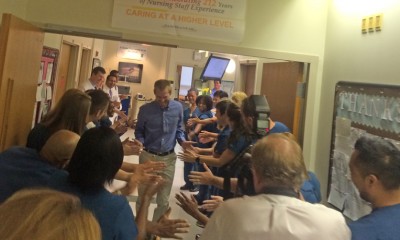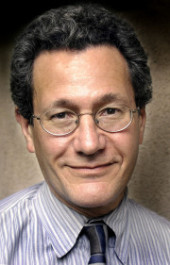President Obama, visiting Atlanta on Tuesday to talk to officials at the CDC about the Ebola crisis, announced a ramped-up response as the West African epidemic “is spiraling out of control.”
The U.S. will assign 3,000 military personnel to the region to supply medical and logistical support, train as many as 500 health care workers a week, and build 17 heath care facilities in the region of 100 beds each. “We have to act fast,’’ Obama said.
The head of the Task Force for Global Health, a Georgia-based nonprofit that runs health programs in West African nations, called the president’s plan “a very good idea.’’
Dr. Mark Rosenberg, CEO and president of the Task Force, told GHN, “We’ve got to step up our effort. The disease is diagnosable, patients can be isolated to control spread, and they can be given supportive care. In this way we can control the spread and help the affected people. It is not hopeless.”
“There is a huge amount that needs to be done.”
More than 2,400 people have died in the Ebola epidemic. Obama called some of the West African scenes of death “absolutely gut-wrenching.”
“It’s spiraling out of control,’’ Obama said. “It’s spreading exponentially.”
Rosenberg said the Decatur-based Task Force isn’t involved directly in the Ebola campaign, but has many programs in West Africa, including fighting neglected tropical diseases and strengthening nations’ health system capacity.
He said he is concerned that even the new U.S. aid is not enough, and that more is needed from other nations.
“It should not send the wrong signal: We don’t want people to think that now the people in West Africa have all the resources they need,” Rosenberg said.
Atlanta is in some ways at the center of the response to the crisis. The Atlanta-based CDC has deployed hundreds of its workers to the Ebola effort. “This is the largest international response in the history of the CDC,’’ Obama said Tuesday.

Emory University Hospital in Atlanta is caring for a third American stricken with the Ebola virus who was evacuated from West Africa. Two others have been discharged from the hospital after treatment there. The president Tuesday congratulated the Emory medical staff on their care for these patients.
The CDC Foundation has received a $9 million donation from the Paul G. Allen Family Foundation to help combat the Ebola outbreak. The funding will support CDC’s efforts to establish emergency operations centers for the countries of Guinea, Liberia and Sierra Leone.
Meanwhile, the World Health Organization has warned that the number of Ebola cases in West Africa could start doubling every three weeks and that the crisis could end up costing nearly $1 billion to contain.
“It’s a potential threat to global security if these countries break down,” Obama said, speaking of the hardest-hit countries of Liberia, Sierra Leone and Guinea.
Rosenberg noted that the cost at Emory to treat one of the Ebola victims was probably in the range of $10,000 per day.
“In West Africa, not only do they not have the $10,000 a day, they don’t have the hospitals to begin with. They need facilities, health care workers, medicines and an informed citizenry.”
Earlier in the day, Obama met with Dr. Kent Brantly, who received care for Ebola at Emory. Brantly, who contracted the disease in Liberia, also testified Tuesday before a U.S. Senate committee about Ebola.
Sen. Lamar Alexander (R-Tenn.) said urgent action was needed. “We must take the dangerous, deadly threat of the Ebola epidemic as seriously as we take ISIS,” he said, referring to the Mideast terrorist army that the U.S. is battling, the Associated Press reported.
The American response will focus on Liberia, the worst hit of the three countries. The initiative will include opening a joint command center in Monrovia, the capital.
The U.S. will also provide home health care kits to hundreds of thousands, and a home- and community-based campaign will train local populations on handling exposed patients.
Obama noted that the CDC and other health experts say that the chances of the outbreak will spread to the U.S. – where the public health capacity is much stronger — are “extremely low.”
Rosenberg said it will be important to explain that the U.S. troops will not be in West Africa to fight anyone, “but to help people get the care and attention that they need.’’
“You know the proverb: Give a man a fish and you feed him for a day; teach a man to fish and you feed him for a lifetime. It is the same with building the capacity for providing health care.
“Send a nurse, doctor or community health worker, and you can care for a person for a day, week, or month; train a nurse, community health worker, or physician and you provide care for a lifetime. We need to build ‘fishing schools,’ or even better yet, train people there who can build ‘fishing schools’ there.”

